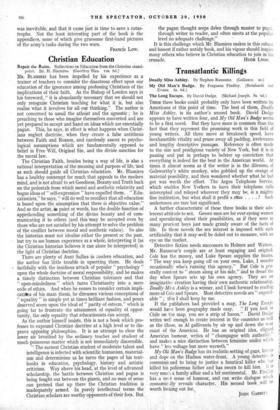Two Years in India While Memory Serves. By Lieutenant-General Sir
Francis Tuker. (Cassell. 25s.) IMPARTIAL historians have still toTrelate the full story of all the events which preceded and immediately followed the partition of India. This should be done not with any inten- tion of stirring the embers of communal feeling, but in the interests of truth and as a warning for the future. It might well be disastrous to the relations of India and Pakistan if there should grow up around the dreadful tragedies of those years fantastic legends of the type circulating about the Indian National Army—that section of the Indian Army which, captured in Malaya, went over to the enemy and eventually surrendered with the exception of its chief, Subhas Chandra Bose, who was killed in an air crash while flying to Tokyo.
Sir Francis Tuker, the last G.O.C.-in-C., Eastern Command, in undivided India, has performed a valuable service in recording from a strictly army point of view the history of the fateful years 1946 and 1947. In doing so he establishes one fact above all others, namely, that it was the Indian Army under its British and' Indian officers which saved pre- partition India from chaos. It was its last magnificent achievement. In General Tuker's words : " Without their impartial and completely loyal help we could never have kept India going so that His Majesty's Government could in the fullness of time hand over control to its new rulers. The admiration of the British officer for the Indian soldier has always been great ; it was immensely enhanced by the manner' in which they fought in this last war, until by 15th August (Partition Day) our respect for these men was unbounded." There is no mistaking the sincerity of these words, and all acquainted with the old Indian Army know that they are justified.
The Indian Army's final achievement was all the more praiseworthy in view of the terrific strain to which it was put : there can be no disputing General Tuker's verdict that " per- haps no other army in history has been so severely tested." The men who returned victorious from the battlefields of Europe, Africa and Asia found a strange and disturbing situation in their own country. They were faced first by the sudden upsurge of popular emotion on behalf of the I.N.A.
arising from the mishandled court-martial of the chief I.N.A. officers, which turned them and their misguided followers into public heroes overnight. General Tuker makes the claim— which few will deny—that this was partially responsible for the Royal Indian Navy Mutiny, to quell which Indian troops were employed. In the months of intense anti-British agitation that followed, the men of the Indian Army were subjected to the strongest kind of political pressure, yet purely Indian troops asked to take their place alongside their British and Gurkha comrades in restoring peace in Calcutta during the riots of February, 1946. That phase soon passed, and an infinitely greater strain was thrown upon Hindu, Muslim and Sikh soldiers by the outbreak, before partition, of communal disorders of appalling ferocity and on a vast scale. These began with the " Great Calcutta Killing " of August, 1946 ; slowly but inexorably mass murder spread northwards through Bengal, Bihar and the U.P. until it reached its ghastly climax in the Punjab. The police were powerless to cope with this horrible type of civil war, and the burden rested squarely on the shoulders of troops sorely tried by what was happening to their own kith and kin. Yet, despite the experiences of men returning from leave in affected areas, the loyalty and discipline of the Indian Army held it together : it was not influenced by communalism until its division into communal armies after partition. Truly, of all the consequences of dividing India, the most tragic was the splitting-up of this magnificent fighting force, so loyal to its ideals and to the British and Indian officers who created and maintained it. General Tuker's long narrative, based on army records, is factual and objective, but at the end he gives his personal views on Indian politics and on the weaknesses which neces- sarily handicap a democracy in ruling over subject peoples. So far as India is concerned,. he agrees that in 1947 partition was inevitable, and that it came just in time to save a catas- trophe. Not the least interesting part of the book is the appendices, some of which give gruesome first-hand pictures of the army's tasks during the two wars.
FRANcis Low.



















 Previous page
Previous page